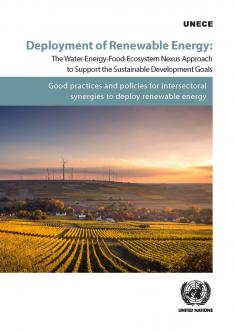Published:

The 2030 Agenda for Sustainable Development includes Sustainable Development Goal (SDG) 7 on access to energy and the related targets set the ambition for increasing the share of renewable energies in the energy mix. Their achievement is closely linked water management (part of SDG 6 on water and sanitation) but also to many other SDGs, notably on food security and sustainable agriculture (SDG 2), and protection and sustainable use of ecosystems (SDG 15). There are synergies but also trade-offs.
The purpose of this brochure is to encourage consideration of good practices and policies for intersectoral synergies and for limiting negative impacts in deploying renewable energy and improving it sustainably. It points at a number of resources that may be helpful for a practical application of a “nexus approach” in development of renewable energy, including guidelines, analytical tools and policy instruments. Overall, the water-energy-food-ecosystems nexus approach promotes coordination and integrated planning and sustainable management of interlinked water, energy, land and environmental resources across sectors.
Hydropower development and generation is an important water user and impact factor in many transboundary river basins. At the same time, there are many potential socio-economic and other benefits from related cooperation across borders.
Transboundary river basin case studies from the Balkans (the Sava and its tributary the Drina), the Caucasus (the Alazani/Ganykh) and Central Asia (the Syr Darya) illustrate concrete synergy opportunities from policy and technical actions, and cooperation. These cases synthesize findings from participatory assessments of the water-energy-food-ecosystems nexus carried out under UNECE Water Convention from 2013 to 2017.
Intersectoral (nexus) assessments could help make renewable energy developments, including bioenergy and hydropower, more sustainable by providing insights into their impacts on water, land and ecosystems.
Prepared in cooperation with the Group of Experts on Renewable Energy (GERE), the brochure underlines that taking the synergies and impacts into account in planning and developing strategies can, in addition to increased resource use efficiency and environmental impacts, bring about wider application and support to renewable energy.
The purpose of this brochure is to encourage consideration of good practices and policies for intersectoral synergies and for limiting negative impacts in deploying renewable energy and improving it sustainably. It points at a number of resources that may be helpful for a practical application of a “nexus approach” in development of renewable energy, including guidelines, analytical tools and policy instruments. Overall, the water-energy-food-ecosystems nexus approach promotes coordination and integrated planning and sustainable management of interlinked water, energy, land and environmental resources across sectors.
Hydropower development and generation is an important water user and impact factor in many transboundary river basins. At the same time, there are many potential socio-economic and other benefits from related cooperation across borders.
Transboundary river basin case studies from the Balkans (the Sava and its tributary the Drina), the Caucasus (the Alazani/Ganykh) and Central Asia (the Syr Darya) illustrate concrete synergy opportunities from policy and technical actions, and cooperation. These cases synthesize findings from participatory assessments of the water-energy-food-ecosystems nexus carried out under UNECE Water Convention from 2013 to 2017.
Intersectoral (nexus) assessments could help make renewable energy developments, including bioenergy and hydropower, more sustainable by providing insights into their impacts on water, land and ecosystems.
Prepared in cooperation with the Group of Experts on Renewable Energy (GERE), the brochure underlines that taking the synergies and impacts into account in planning and developing strategies can, in addition to increased resource use efficiency and environmental impacts, bring about wider application and support to renewable energy.
ECE/MP.WAT/NONE/7

